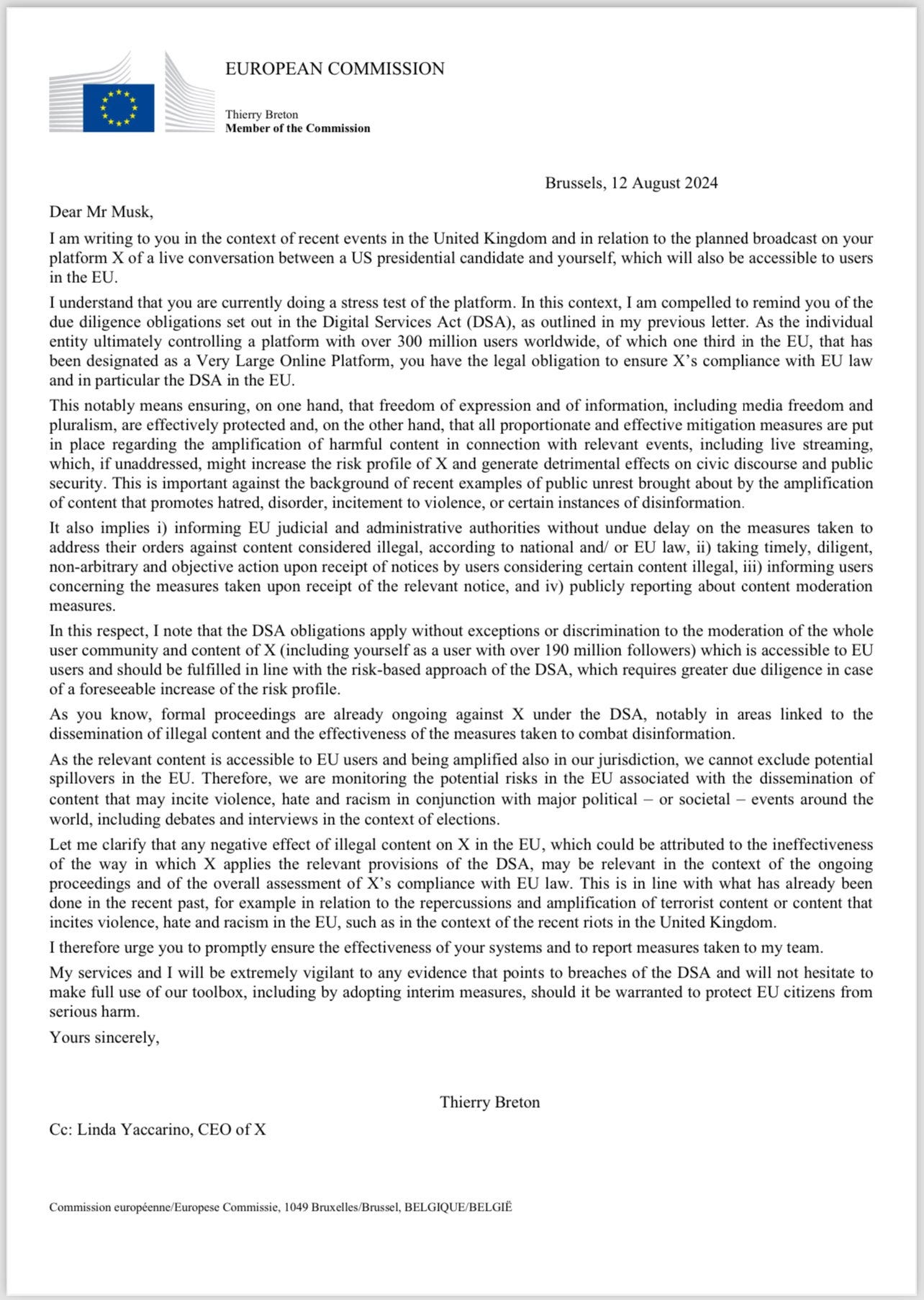On Monday, EU Internal Market Commissioner Thierry Breton published an open letter to Elon Musk on Twitter/X, warning Musk to take measures to contain “harmful content.” Addressing himself to Musk, Mr Breton said he was writing “in the context of recent events in the United Kingdom and in relation to the planned broadcast on your platform of a live conversation between a US presidential candidate and yourself, which will also be accessible to users in the EU.”
Now, on its face, it sounds reasonable that platforms should have to restrict “harmful content.” If we were dealing with things like child pornography or terror plots, we could understand that Twitter/X is under a legal obligation to remove harmful content.
However, it is much harder to understand how a social media platform could reasonably find itself under a legal obligation to remove or restrict a public interview with a U.S presidential candidate. What could be the vital public interest that would justify curtailing political discourse of that nature?

How exactly might the Musk-Trump interview fall foul of the Digital Services Act? Well, the Digital Services Act considers “harmful” content in need of “mitigation measures” to include, among other things, “incitement to hatred,” threats to “civic discourse,” the threat of “misinformation” and “disinformation,” and threats to “public security.” All of these terms are notoriously ambiguous and open to abusive and self-serving interpretations. They could easily be stretched to include a political interview with a U.S. presidential candidate.
For terms such as “disinformation,” “hate speech,” and “civic discourse,” are essentially political terms, not legal terms. They have no clear and widely accepted meaning in the law and certainly none in the context of lively public debates. As such, it was only a matter of time before they would be used to further the political ideology and interests of the European Commission.
And this letter from Breton to Musk is proof that that is exactly what is happening, because Thierry Breton has managed to stretch the notion of “illegal content” to bring within its purview a high-profile interview with a U.S. presidential candidate. That bizarre outcome was already built into the Digital Services Act, which was laced with imprecise terminology just waiting to be harnessed to the partisan political purposes of EU censors.
Now, speaking as a European citizen, I do not feel the need to be protected from the content of an interview with a presidential candidate, and I feel infantilized when Thierry Breton suggests that I need to be protected from the content of such an interview. This is an interview of public interest and an interview that European citizens have a right to hear.
Perhaps Thierry Breton needs to be reminded that no matter how many fudgy terms like “disinformation,” “civic discourse” or “public security” that he may like to use to rationalise censorship, he too is bound by the law, and he is bound by the EU Charter of Fundamental Rights, which protects Europeans’ freedom of expression and information. Article 11 reads:
Everyone has the right to freedom of expression. This right shall include freedom to hold opinions and to receive and impart information and ideas without interference by public authority and regardless of frontiers.
So when Thierry Breton suggests that an interview with the Republican presidential candidate in the United States is something that should trigger censorship, or something that should be restricted in the name of protecting “civic discourse” or countering the threat of “disinformation,” he is protecting nobody but himself and those ideologically and politically aligned with the European Commission.
In attempting to deprive citizens of the right to access public-interest broadcasts unimpeded by political censorship, Mr Breton has made himself the enemy of democracy, the enemy of constitutionalism, and the enemy of freedom of speech.